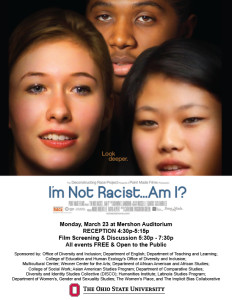I have never been shy about sharing that I don’t appreciate hearing the N-word in my workplace, which includes classrooms and conferences in which texts that liberally use the word will be examined. Besides writing an essay that touches on the issue (2012, details below), I have addressed this by presenting on a “syllabus roundtable” for SSAWW, the Society for the Study of American Women Writers (2015) and by presenting at an Ohio State University English department event about Teaching Tough Topics (2014). For that occasion, I titled my remarks: “The N-word: A Not-So-Tough Topic in the Classroom.”
Below, you’ll find my “Class Covenant,” which is typically on the last page of the course policies for every class I teach, especially those that don’t focus on authors in dominant identity categories. Please feel free to adopt or adapt to suit your purposes. I’m happy to help as many people as possible with effective tools. A gesture like *Adopted/Adapted from Koritha Mitchell would be appreciated. Below the covenant, you’ll find additional explanations and resources.
CLASS COVENANT
Dr. Koritha Mitchell
To ensure that our time together is enriching, students will abide by the terms of this agreement. Anyone in our intellectual community can suggest an addition; the group will decide to accept, reject, or revise it.
1) The majority of our thinking about the literature will be done outside of class. An hour and twenty minutes is not enough time to appreciate the richness of this material. Remaining enrolled in this course means that you are ready to devote the time, effort, and energy to reading and thinking about this literature that it deserves.
2) In this course, we are studying literature. Although we are committed to considering these texts within their historical contexts, we must remain aware that they are creative works and are therefore CRAFTED. We will look at not only the message but also the craft—the artistic elements—that shape the delivery of that message.
3) This class will be free of hate speech regarding sexual orientation, gender expression, race, and socio-economic status or background. Inflammatory remarks will not go unchecked and will not be tolerated. Each member of this class is responsible for fostering an environment in which people and their ideas are respected. For the same reasons, students will strive to make remarks that are informed by our material and the history that surrounds it.
4) The N-word won’t be used in this class by a person of any race, even if it consistently appears in our texts. The same goes for the “F” word, regardless of a person’s (perceived) sexual orientation or gender expression. And, this is simply not a space in which we call people “trash.”
5) Profanity will not be common currency in this class.
~~~~~~~~~~~~~~~~~~~~~~~~~~~~~~~~~~~~~~~~~~~~~~~~~~~~~~~~~~~~~~~~
The N-word is not uttered in my classes, even if it appears in the reading. We simply say N or N’s when reading passages aloud. It easily becomes part of how we do things. It doesn’t take a PhD for my students to understand that we are literary critics, not re-enactors, so we need not let the text dictate what we give life to in the classroom. Just as their papers won’t generally refer to African Americans as “Negroes,” why must we operate as if the text leaves us no choice but to enact discursive violence? Is anything taken away because the word isn’t uttered while everyone is looking at it? Has learning been compromised? Might learning actually be enhanced because students aren’t having to work around the gut-punch some of them feel when they hear that word? The following help explain why I have adopted this practice:
UPDATE: as of March 4, 2019, The N-word in the Classroom: Just Say NO is available. It’s a 45-minute audio recording about how to handle racial and other slurs responsibly and with intellectual rigor. C19 Podcast: Official Publication of the Society for Nineteenth-Century Americanists. http://bit.ly/2TAkuU5
“Belief and Performance, Morrison and Me.” The Clearing, 1970-2010: Forty Years with Toni Morrison. Ed. Carmen Gillespie. Lewisburg, PA: Bucknell UP, 2012. 245 – 261. [downloadable from the Intellectual Autobiography section of http://www.korithamitchell.com/books-articles/]
“I’m a professor. My colleagues who let their students dictate what they teach are cowards.” Vox. June 10, 2015.
Also see: “An Open Letter to White People From Two Professors of Color: Step Up!” (co-authored with anthropologist Alex E. Chávez). The Huffington Post. March 21, 2017.
Also see: “In America, White Women Can Get Away With Almost Anything.” The Huffington Post. March 16, 2018.
Connected to all these issues: “Responsible Teaching in a Violent Culture” http://www.korithamitchell.com/workshops/




